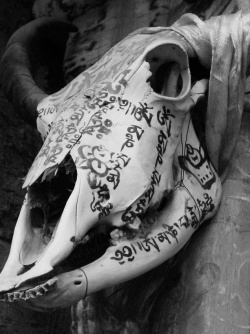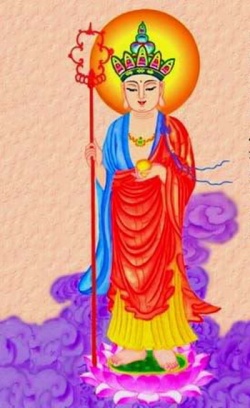Difference between revisions of "Taayano Sutta"
m (Text replace - "Category:Samyutta Nikaya" to "{{R}} [http://www.dhammawiki.com/index.php?title=Category:Samyutta_Nikaya dhammawiki.com] Category:Samyutta Nikaya") |
|||
| (4 intermediate revisions by the same user not shown) | |||
| Line 1: | Line 1: | ||
| − | Taayana | + | {{DisplayImages|3368|1546}} |
| + | {{Centre|{{Big2x|Taayana }}<br/> | ||
| + | translated from the [[Pali]] by <br/> | ||
| + | Maurice O'Connell Walshe}}<br/><br/> | ||
| − | + | [[Thus have I heard]]. At one [[time]] the [[Blessed One]] was staying at Saavatthii...Then Taayana, son of the [[devas]],[1] formerly a [[teacher]] of a [different] [[sect]],...[2] spoke thus in verse before the [[Blessed One]]: | |
| − | + | <poem> | |
| − | + | Put forth strength and cut the {{Wiki|stream}} at the source, | |
| − | + | [[Brahman]],[3] scatter all [[desires]] of the [[sense]].[4] | |
| − | Thus have I heard. At one time the Blessed One was staying at Saavatthii...Then Taayana, son of the devas,[1] formerly a teacher of a [different] sect,...[2] spoke thus in verse before the Blessed One: | + | Else the [[Wikipedia:Sage (sophos|sage]] can not attain the goal.[5] |
| − | + | That which must be done, with [[vigor]] do:[6] | |
| − | Put forth strength and cut the stream at the source, | ||
| − | Brahman,[3] scatter all desires of the sense.[4] | ||
| − | Else the sage can not attain the goal.[5] | ||
| − | That which must be done, with vigor do:[6] | ||
Feeble recluseship but stirs up dust. | Feeble recluseship but stirs up dust. | ||
| − | Better nothing done than evil wrought: | + | Better nothing done than [[evil]] wrought: |
| − | Ill one's done will cause one pain again. | + | Ill one's done will [[cause]] one [[pain]] again. |
| − | If the deed is good, it's better done: | + | If the [[deed]] is good, it's better done: |
| − | Good deeds will bring no pain to come. | + | [[Good deeds]] will bring no [[pain]] to come. |
A blade of grass if wrongly seized, | A blade of grass if wrongly seized, | ||
Will only serve to cut the clumsy hand, | Will only serve to cut the clumsy hand, | ||
| − | So ascetic life, if wrongly tried, | + | So [[ascetic]] [[life]], if wrongly tried, |
Merely drags one down to states of woe.[7] | Merely drags one down to states of woe.[7] | ||
Whatever action's slackly carried out, | Whatever action's slackly carried out, | ||
Practices improperly observed, | Practices improperly observed, | ||
| − | Dubious keeping of the holy life: | + | Dubious keeping of the {{Wiki|holy}} [[life]]: |
None of this will bring a great reward. | None of this will bring a great reward. | ||
| − | So said Taayana the devas' son and, so saying, he passed with his right side to the Blessed One in salutation and vanished there and then. And when the night was past the Blessed One addressed the bhikkhus. | + | So said Taayana the [[devas]]' son and, so saying, he passed with his right side to the [[Blessed One]] in salutation and vanished there and then. And when the night was {{Wiki|past}} the [[Blessed One]] addressed the [[bhikkhus]]. |
| − | + | </poem> | |
[He repeated the verses and then said:] | [He repeated the verses and then said:] | ||
| − | "Bhikkhus, learn Taayana's verses, learn them by heart; Taayana's verses are for your good, they pertain to the fundamentals of the holy life." | + | "[[Bhikkhus]], learn Taayana's verses, learn them by [[heart]]; Taayana's verses are for your good, they pertain to the fundamentals of the {{Wiki|holy}} [[life]]." |
==Notes== | ==Notes== | ||
| Line 34: | Line 33: | ||
1.Devaputta. See Vol. I, n. 7. | 1.Devaputta. See Vol. I, n. 7. | ||
| − | 2.Though he held certain wrong views, he believed in kamma (a vital point!), and so was reborn in a heaven state. He came to realize the superiority of the Buddha's teaching and therefore came to encourage disciples. | + | 2.Though he held certain [[wrong views]], he believed in [[kamma]] (a [[vital]] point!), and so was [[reborn]] in a [[heaven]] state. He came to realize the {{Wiki|superiority}} of the [[Buddha's teaching]] and therefore came to encourage [[disciples]]. |
| − | 3.Used here in the sense of a recluse. | + | 3.Used here in the [[sense]] of a [[recluse]]. |
4.Dhp 383. | 4.Dhp 383. | ||
| − | 5.Ekatta.m: "unity." | + | 5.Ekatta.m: "{{Wiki|unity}}." |
6.The next 16 lines are found (differently ordered) as Dhp 313/314, 311/312. | 6.The next 16 lines are found (differently ordered) as Dhp 313/314, 311/312. | ||
| − | 7.Niraya: "the downward path." | + | 7.Niraya: "the downward [[path]]." |
{{R}} | {{R}} | ||
[http://www.dhammawiki.com/index.php?title=Category:Samyutta_Nikaya dhammawiki.com] | [http://www.dhammawiki.com/index.php?title=Category:Samyutta_Nikaya dhammawiki.com] | ||
| − | [[Category: | + | [[Category:Saṃyutta Nikāya]] |
Latest revision as of 16:00, 3 April 2014
Taayana
translated from the Pali by
Maurice O'Connell Walshe
Thus have I heard. At one time the Blessed One was staying at Saavatthii...Then Taayana, son of the devas,[1] formerly a teacher of a [different] sect,...[2] spoke thus in verse before the Blessed One:
Put forth strength and cut the stream at the source,
Brahman,[3] scatter all desires of the sense.[4]
Else the sage can not attain the goal.[5]
That which must be done, with vigor do:[6]
Feeble recluseship but stirs up dust.
Better nothing done than evil wrought:
Ill one's done will cause one pain again.
If the deed is good, it's better done:
Good deeds will bring no pain to come.
A blade of grass if wrongly seized,
Will only serve to cut the clumsy hand,
So ascetic life, if wrongly tried,
Merely drags one down to states of woe.[7]
Whatever action's slackly carried out,
Practices improperly observed,
Dubious keeping of the holy life:
None of this will bring a great reward.
So said Taayana the devas' son and, so saying, he passed with his right side to the Blessed One in salutation and vanished there and then. And when the night was past the Blessed One addressed the bhikkhus.
[He repeated the verses and then said:]
"Bhikkhus, learn Taayana's verses, learn them by heart; Taayana's verses are for your good, they pertain to the fundamentals of the holy life."
Notes
1.Devaputta. See Vol. I, n. 7.
2.Though he held certain wrong views, he believed in kamma (a vital point!), and so was reborn in a heaven state. He came to realize the superiority of the Buddha's teaching and therefore came to encourage disciples.
3.Used here in the sense of a recluse.
4.Dhp 383.
5.Ekatta.m: "unity."
6.The next 16 lines are found (differently ordered) as Dhp 313/314, 311/312.
7.Niraya: "the downward path."

